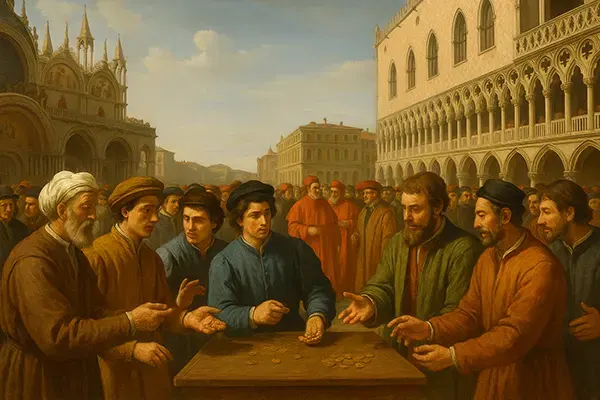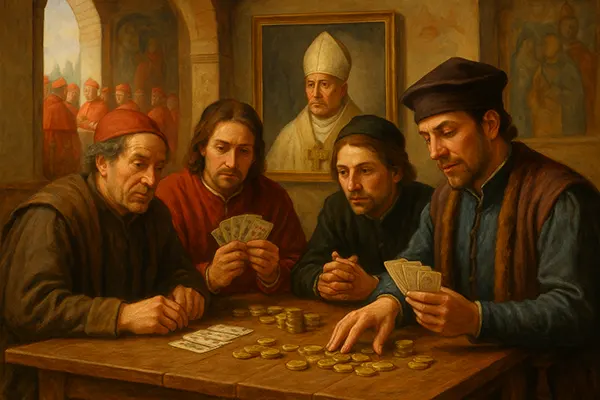Throughout history, the intersection of politics and gambling has revealed much about societies and their approach to uncertainty, influence, and collective curiosity. One of the most fascinating examples is found in Renaissance Europe, where betting on papal elections was a widespread and socially accepted activity. These wagers reflected not only entertainment but also deep political engagement, shaping the way communities interacted with power and authority.
The Emergence of Political Betting in Rome and Venice
By the fifteenth century, both Rome and Venice had established themselves as centres of political intrigue and public speculation. When the papal throne became vacant, the choice of the next pope held immense consequences for European states, monarchies, and local economies. The uncertainty of these outcomes quickly became the subject of betting among citizens, merchants, and even members of the clergy.
In Rome, bookmakers operated openly, setting odds based on rumours from the conclave. Wealthy families and foreign ambassadors placed significant sums, seeing wagers as both a pastime and a subtle means of demonstrating political alignment. Venice, known for its sophisticated culture of gambling, provided an environment where bets on papal elections merged naturally with the city’s broader passion for games of chance.
These practices demonstrated that political speculation was not confined to elites alone. Ordinary citizens, often excluded from decision-making, could symbolically participate by placing bets, turning high-level politics into a public spectacle with personal stakes attached.
Societal Impact of Wagering on the Papacy
The popularity of betting on papal elections showed how political engagement extended beyond formal institutions. Through wagers, individuals created a shared narrative around the conclave, following developments closely and interpreting each rumour with economic interest. In many ways, betting served as an early form of political commentary, blending financial risk with informed predictions.
For the authorities, this phenomenon was double-edged. On one hand, it allowed public discourse and demonstrated society’s attentiveness to religious authority. On the other, excessive betting could undermine the sanctity of the process, trivialising the election of a pope into a matter of chance and profit. Despite this tension, political betting remained deeply embedded in civic culture.
Moreover, the act of gambling on papal succession highlighted how Renaissance Europe balanced reverence for religion with pragmatic approaches to power. Citizens recognised the election as both divine and political, using bets as a way to reconcile uncertainty with material action.
The Mechanisms of Political Predictions
The mechanics of betting during papal elections reflected the knowledge structures of the time. Bookmakers set odds by combining insider information, rumours, and historical precedent. Diplomatic channels often served as conduits for speculation, as ambassadors leaked preferences of cardinals or alliances within the conclave. The volatility of wagers mirrored shifts in the political landscape, making betting markets a real-time measure of political expectations.
Importantly, the activity was not confined to gambling houses. Wagers circulated in private salons, taverns, and merchant exchanges, where political gossip turned into financial stakes. The broader public used this opportunity to test their understanding of politics, sharpening their analytical skills through prediction.
In a society where access to formal participation in governance was limited, betting functioned as an informal system of forecasting. The wagers served as indicators of collective sentiment, offering insights into how different segments of society interpreted the balance of power.
Parallels with Modern Political Forecasting
While the papal betting practices of Renaissance Italy may seem distant, they laid the groundwork for the modern intersection of politics, prediction, and economics. Today’s prediction markets, opinion polls, and betting exchanges echo the same principle: transforming uncertainty into measurable, tradable information.
The Renaissance demonstrated that betting was never merely a pastime but a way to democratise political speculation. By attaching financial consequences to their predictions, individuals became more invested in understanding the mechanics of power. This connection between knowledge and risk resonates strongly with modern democratic societies, where transparency and public engagement remain central values.
However, modern systems often emphasise regulation, transparency, and data-driven analysis, whereas Renaissance betting thrived in the shadows of rumours and personal alliances. Despite this difference, the underlying impulse to transform political uncertainty into structured prediction remains remarkably consistent across centuries.

Broader Cultural Significance of Political Wagering
The existence of political betting in Rome and Venice reveals much about Renaissance values. It demonstrates how societies viewed politics as a shared drama, one in which the public could participate indirectly. This engagement blurred the lines between sacred authority and civic entertainment, embedding political life into everyday culture.
Beyond entertainment, such practices also played a role in shaping trust and scepticism. The willingness to wager money on outcomes reflected both faith in the electoral process and doubt about its unpredictability. By doing so, communities expressed a pragmatic view of governance, acknowledging that even sacred institutions were subject to human manoeuvring.
Ultimately, betting on papal elections was not a marginal activity but a reflection of how societies processed uncertainty. Through wagers, Renaissance Europeans expressed curiosity, critique, and a desire for agency in a world where political outcomes were often beyond their control.
Legacy of Renaissance Political Predictions
The culture of political betting during the fifteenth and sixteenth centuries left a lasting mark on European thought. It illustrated the enduring human fascination with prediction, the blending of chance with strategy, and the pursuit of knowledge through risk.
Modern political science, economics, and sociology all trace elements of their methods back to these early practices. By turning political transitions into betting opportunities, Renaissance citizens created a participatory framework that continues to resonate in contemporary society.
In this way, what began as wagers in the streets of Rome and the salons of Venice evolved into an enduring model of political engagement, demonstrating the timelessness of the human urge to anticipate the future and attach meaning to uncertainty.

